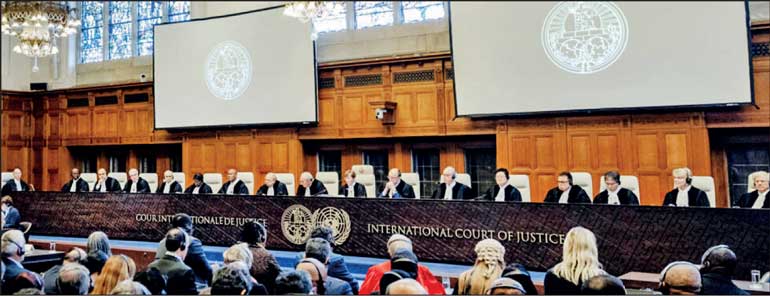Saturday Feb 14, 2026
Saturday Feb 14, 2026
Saturday, 10 February 2024 00:00 - - {{hitsCtrl.values.hits}}

A particular question pertains to why the ICJ has not indicated a specific provisional measure ordering Israel to cease fire
 With regard to the Order delivered by the International Court of Justice indicating Provisional Measures against Israel in the case brought by South Africa under the provisions of the UN Genocide Convention, questions galore on different aspects addressed. A particular question pertains to why the ICJ has not indicated a specific provisional measure ordering Israel to “cease fire”.
With regard to the Order delivered by the International Court of Justice indicating Provisional Measures against Israel in the case brought by South Africa under the provisions of the UN Genocide Convention, questions galore on different aspects addressed. A particular question pertains to why the ICJ has not indicated a specific provisional measure ordering Israel to “cease fire”.
It is important to refer to Article 51 of the UN Charter for guidance in this context.
Article 51 states:
“Nothing in the present Charter shall impair the inherent right of individual or collective self-defence if an armed attack occurs against a Member of the United Nations, until the Security Council has taken measures necessary to maintain international peace and security.”
This makes it clear that every UN member state has an inherent right to self-defence which cannot be ‘restricted’ under the International Law except as may be decided by the Security Council in terms of the above cited Charter provisions.
There is of course an array of International Humanitarian Law instruments which regulate the conduct of a war. Nevertheless, these instruments do not provide for “ceasefire” directly in relation to any war. It is because their provisions become applicable only when a war has begun and is active. Accordingly there is no clear humanitarian law obligation upon a party to a war to cease fire during a war situation. Any ceasefire observed by a party to a war is considered as part of a military practice, not as a matter of legal obligation.
Violations of humanitarian law committed by a party during the conduct of an armed conflict, however, is quite a different matter, which should be dealt with according to the International Humanitarian Law, and in the case of parties to the Statute of the International Criminal Court (Rome Statute), according to the provisions of the Rome Statute.
It may be noted that the case before the International Court of Justice is not about violations of the International Humanitarian Law per se, even as it cites such violations in its support. It is specifically about the violation of the provisions of the Genocide Convention to which both Israel and South Africa are parties.
In exercising its Provisional Measures power, the ICJ has decided not to indicate any measure which could perceivably violate the right of a state provided for in the UN Charter (Article 51). Israel’s right to self-defence is therefore not ‘impaired’ by this decision.
What is deducible from
all this?
The ICJ appears to have made it clear that theoretically (and legally) speaking you have your right to self-defence, but it cannot be exercised in such a way that violates Article 2 of the UN Genocide Convention, or its other provisions which specify what and what would amount to “genocide”.
Maybe the ICJ Order in this instance is a middle ground reached within its ranks where different opinions may have existed on the whole gamut of issues brought before it. It is perhaps the reason that the Order has granted most provisional measures sought by South Africa except ‘immediate ceasefire’, and has gone on to add one more to the list, ordering Hamas to release all hostages in its captivity (Israel, of course, had demanded, while making its defence at the ICJ, that it is Hamas which should be made responsible for acts of genocide against Israeli people and that Hamas should release all hostages in its captivity forthwith).
In short, by its order on provisional measures, the Court appears to have accepted the basic premise of the South African case, that there is a probable risk of acts of genocide being committed by Israel, although the actual determination on merit as to whether acts of genocide were indeed committed would be made in its final judgement, which is several years away.
It is interesting that, in order to arrive at the opinion that there is a probable risk of the commission of acts of genocide, the Court has extensively quoted the UN Secretary General and heads of other international organisations and agencies. This includes in particular the letters addressed by the Secretary General to the UN Security Council drawing its urgent attention to the situation in Gaza and the worsening humanitarian conditions there, especially highlighting the gradual collapse of the healthcare system (hospitals) in Gaza.
The moral implications of the ICJ Order, in my considered view, are especially on the Security Council. It implies that the Security Council was warned by the Secretary General of the emerging humanitarian catastrophe in Gaza from time to time. A possible reading of this observation is that the Security Council had all the information required for it to act in prevention of a humanitarian disaster (read: in prevention of alleged acts of genocide) from occurring, in exercising its power to maintain “international peace and security” but it has not done so decisively. But the reality is that the Security Council has not “acted” decisively due to the US veto.
It may be unrealistic to expect, but it needs to be stressed, nevertheless, that the onus of demonstrating to the world that it has not failed miserably in its duty now falls squarely back on the Security Council. With the ICJ Order staring in its face, whether the Security Council would still choose to go in the same direction it used to in relation to the violation of the rights of Palestinians under occupation, remains open.